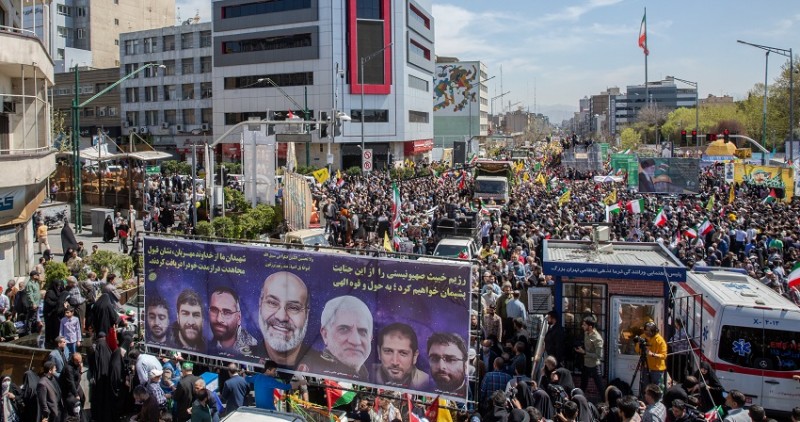
Tensions between Iran and Israel have escalated following Israeli airstrikes that killed senior Iranian military commanders. Iran has vowed retaliation, raising fears of open conflict. Both Israel and the US are on high alert, anticipating potential Iranian strikes. The recent airstrike in Damascus, targeting Iranian officers, has intensified the situation. Iranian officials have placed their armed forces on full alert, while Hezbollah's leader warns of a response. Despite previous attacks, Iran has avoided direct conflict with Israel, but the current situation remains volatile. The funeral of the slain officers in Tehran coincided with a Quds Day rally, marked by anti-Israel and anti-US sentiments. Iranian President Raisi and military leaders attended the procession, emphasizing Iran's readiness to respond. The coffins of the officers were honored by Ayatollah Khamenei, indicating the significance of the event to Iran's leadership. The situation is closely monitored for any further escalation or potential retaliation.
Escalating Tensions: The tensions between Iran and Israel have heightened after Israeli airstrikes targeted and killed senior Iranian military commanders. This has significantly raised concerns about the possibility of a broader conflict between the two nations.
Iran's Vow for Retaliation: Iran has publicly vowed to retaliate against Israel for the airstrikes. Iranian officials have indicated that they are preparing for a direct response to the attacks, although the exact nature and timing of this retaliation remain unclear.
High Alert Status: Both Israel and the United States are on high alert, anticipating potential retaliation from Iran. Military forces in the region have been placed on heightened readiness, and precautionary measures have been taken to prepare for any possible attacks.
Airstrike in Damascus: The recent Israeli airstrike in Damascus, targeting Iranian officers, has exacerbated tensions further. This strike was notable for its impact on multiple senior Iranian military figures and its targeting of a location within the Iranian Embassy complex.
Iranian Preparedness: Iranian officials have stated that their armed forces are on full alert in response to the situation. The country's military leadership is reportedly considering various options for retaliation against Israel.
Hezbollah's Warning: Hezbollah's leader, Hassan Nasrallah, has warned of a potential response from Iran. He emphasized the need for preparedness and stated that Iran's retaliation could come at any time.
Avoidance of Direct Conflict: While Iran has previously avoided direct confrontation with Israel, the current situation remains volatile. Despite engaging in proxy conflicts through allied groups like Hezbollah, Iran has refrained from direct military engagement.
Funeral and Rally in Tehran: The funeral procession for the slain Iranian officers in Tehran coincided with the annual Quds Day rally, which saw anti-Israel and anti-US sentiments expressed by attendees. Iranian President Raisi and military leaders participated in the event, reaffirming Iran's resolve in the face of perceived aggression.
Ayatollah's Tribute: Ayatollah Khamenei personally honored the coffins of the slain officers, underscoring the significance of their sacrifice and signaling Iran's determination to respond decisively.
Monitoring for Escalation: The situation is being closely monitored for any further escalation or potential retaliation from either side. Military analysts and officials are assessing the developments to anticipate future actions and mitigate the risk of a broader conflict.